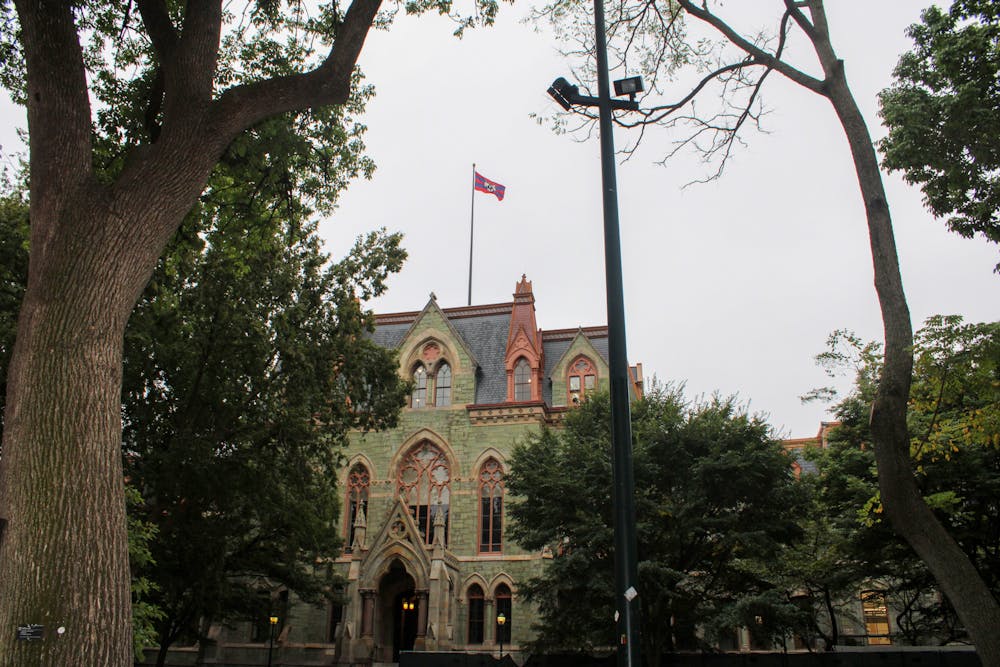
As Penn seniors look ahead to their job prospects after graduation, several students expressed concerns about entering the fields of public service and the arts following the election of 1968 Wharton graduate Donald Trump as president.
In 2023, the DP reported that almost 50% of Penn graduates go into finance or consulting following graduation — the highest percentage of any Ivy League institution — and that the numbers seem to be climbing. However, students in the other 50% who spoke with The Daily Pennsylvanian voiced anxieties about the impact of Trump's election on the job market, especially for those who plan to work in government or require a visa in order to remain in the United States.
College senior and former Penn in Washington participant Sarah Oburu expressed doubts about wanting to go directly into government following graduation. She cited concerns that her record as an aspiring public defender would be tarnished by associations with the incoming administration.
“At the end of the day, when I put it on my resume, and when you see the timestamps, you’re gonna know I worked for the Trump administration,” Oburu said. “And I don’t know how comfortable I would feel having that on there as a Black woman, when the new president-elect has very strong opinions about Black women.”
Instead, she said she is now considering going to law school and hopes that America will have a new president before she enters the job market, which she described as being “very rough,” particularly in the field of public service.
“For young people, it’s just like, is it worth it?” Oburu said.
College senior Dina Zhanybekova, an international student from Kazakhstan who wants to pursue acting, said she was "very stressed out at first" about how the election would impact her ability to remain in America. In the days after the election, international students at Penn expressed concerns about the status of their visas and their ability to work in the United States after graduation.
Zhanybekova said she was “very reliant on the talent visa" — the O-1 visa that allows individuals with extraordinary ability in various fields, including the arts, to apply to work in the U.S. — but is less reliant on that possibility after Trump's election. However, she added that she is hopeful that following the election, non-American creatives feel empowered to bolster the creative industries of their home countries rather than relying on Hollywood.
Zhanybekova also discussed the pressure she has felt from Penn’s culture to go into a field that is “more stable.” This led to her initially working for production companies, despite feeling constrained in office settings and not enjoying the work. She said that now she is pursuing what she is more passionate about.
“Yes, [the film industry] is unstable, but so far, I’ve been getting jobs on film sets,” Zhanybekova said. “And I’ve worked with people in New York, and L.A., and it worked out pretty fine.”
College senior Isabella Werneck also expressed worries about her immigration status as she goes into the music industry after the election. She has a job lined up at TikTok after graduation, but her plan is to become a solo artist in the future.
Werneck said that securing a visa as someone going into arts and entertainment is particularly difficult, as “consulting and banking” are the “big companies that tend to sponsor [students].” As someone not pursuing those industries, Werneck says that she felt “very limited in options.”
“Penn is not the most entertainment-oriented school,” Werneck said. As a result of feeling unsupported institutionally, Werneck has found community in clubs such as Kinoki Senior Society, the Songwriters Collective, Wharton Undergraduate Media and Entertainment, and the club that she founded, 215Records. In those communities, Werneck reported feeling a lot of anxiety about the results of the 2024 election.
“I think that people that are into arts and entertainment tend to be very liberal and very open about their opinions,” Werneck said.
Werneck described the incoming job market as “scary” and “defeating,” but emphasized her belief that art and entertainment will be able to thrive.
“When you’re facing a more conservative-led government, that’s usually when art thrives,” Werneck said. “I think [the election] is going to impact entertainment in the sense that we’re going to see so much new production. Art is intrinsically related to politics and personal freedoms.”
College senior Ava Cima, who is figuring out what she wants to do with her anthropology degree postgraduation, said that she is "taking it day by day" amid the uncertainty surrounding the election.
Cima discussed the pressure from Penn and her peers to go into finance or consulting — careers that she has no interest in, but that she knows would set her up for financial success and feels that Penn’s infrastructure best supports.
“I think everyone has this moment in their Penn career where they pause, and think, ‘Should I go into consulting?’” Cima said. “There’s this construction built up that if I’m not doing something in New York that makes a lot of money, then I’m doing postgraduate wrong.”
As a tour guide at Penn, Cima said she fields numerous questions from incoming and prospective Penn about how the election might impact higher education.
“We don’t know what kind of implications it will actually have,” Cima said. “We don’t know if it will have an impact starting next semester; we don’t know if it will have an impact starting in four years. It’s hard to operate under certain assumptions that everything will stay the same.”
The Daily Pennsylvanian is an independent, student-run newspaper. Please consider making a donation to support the coverage that shapes the University. Your generosity ensures a future of strong journalism at Penn.
Donate






